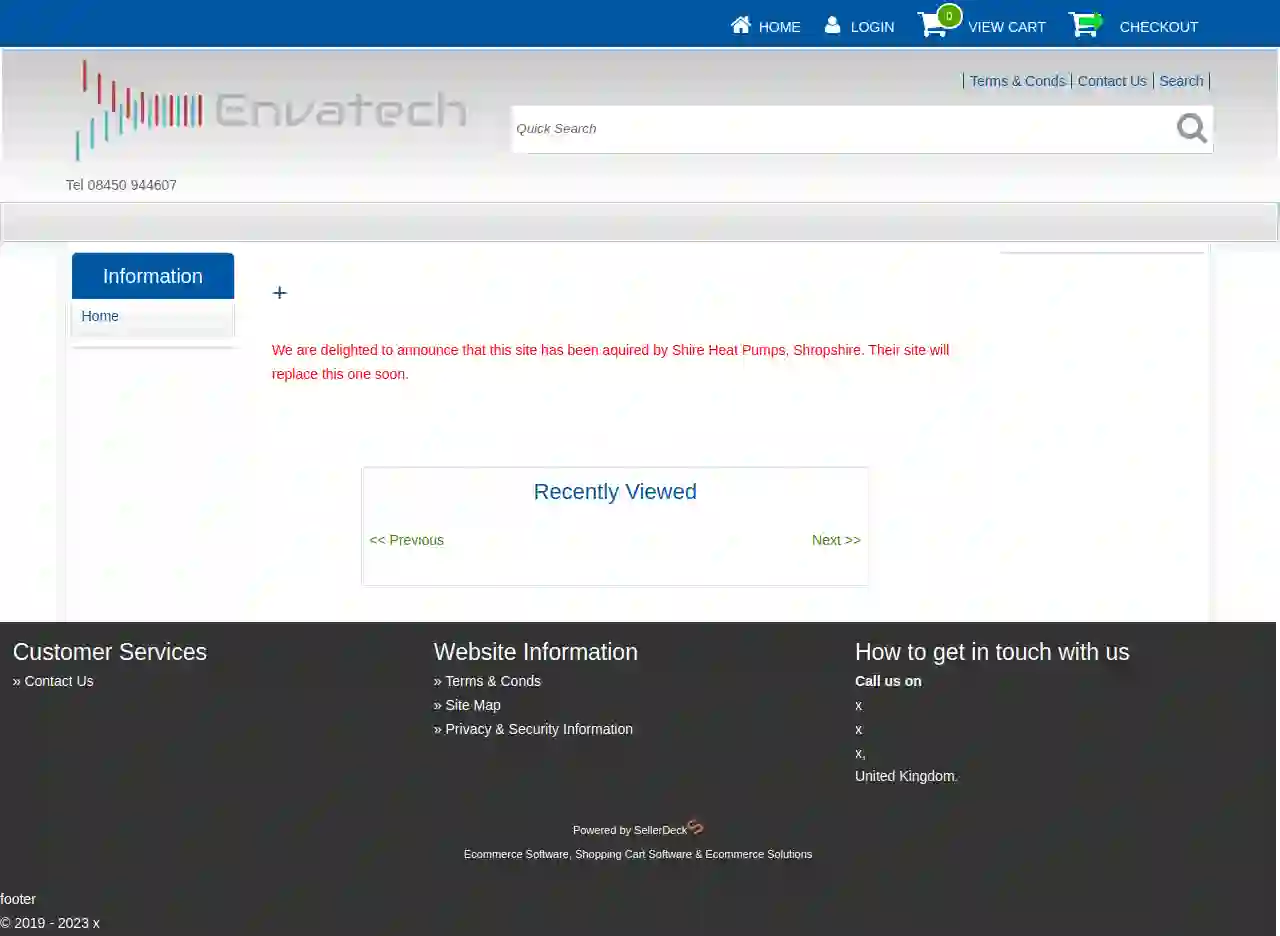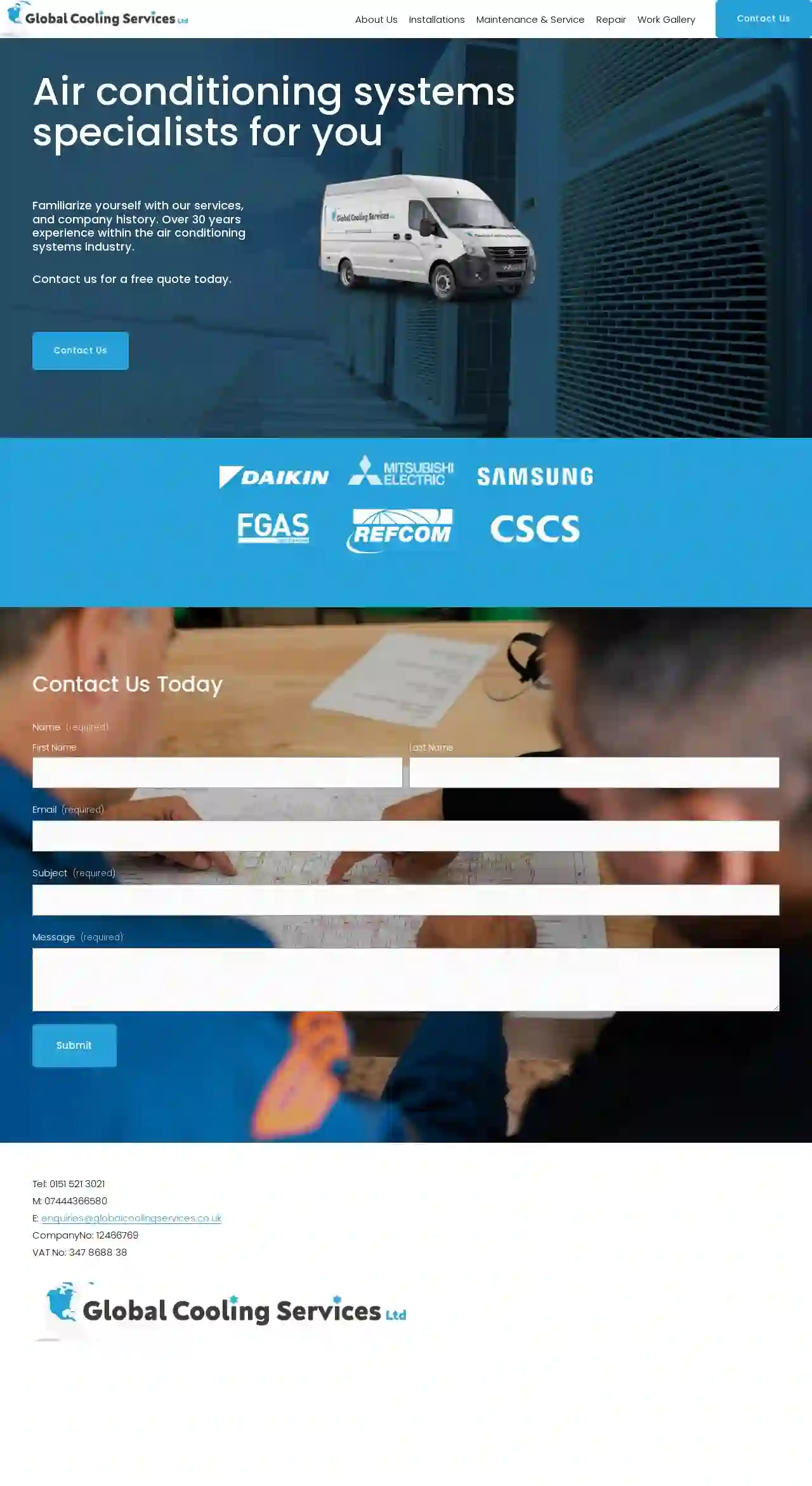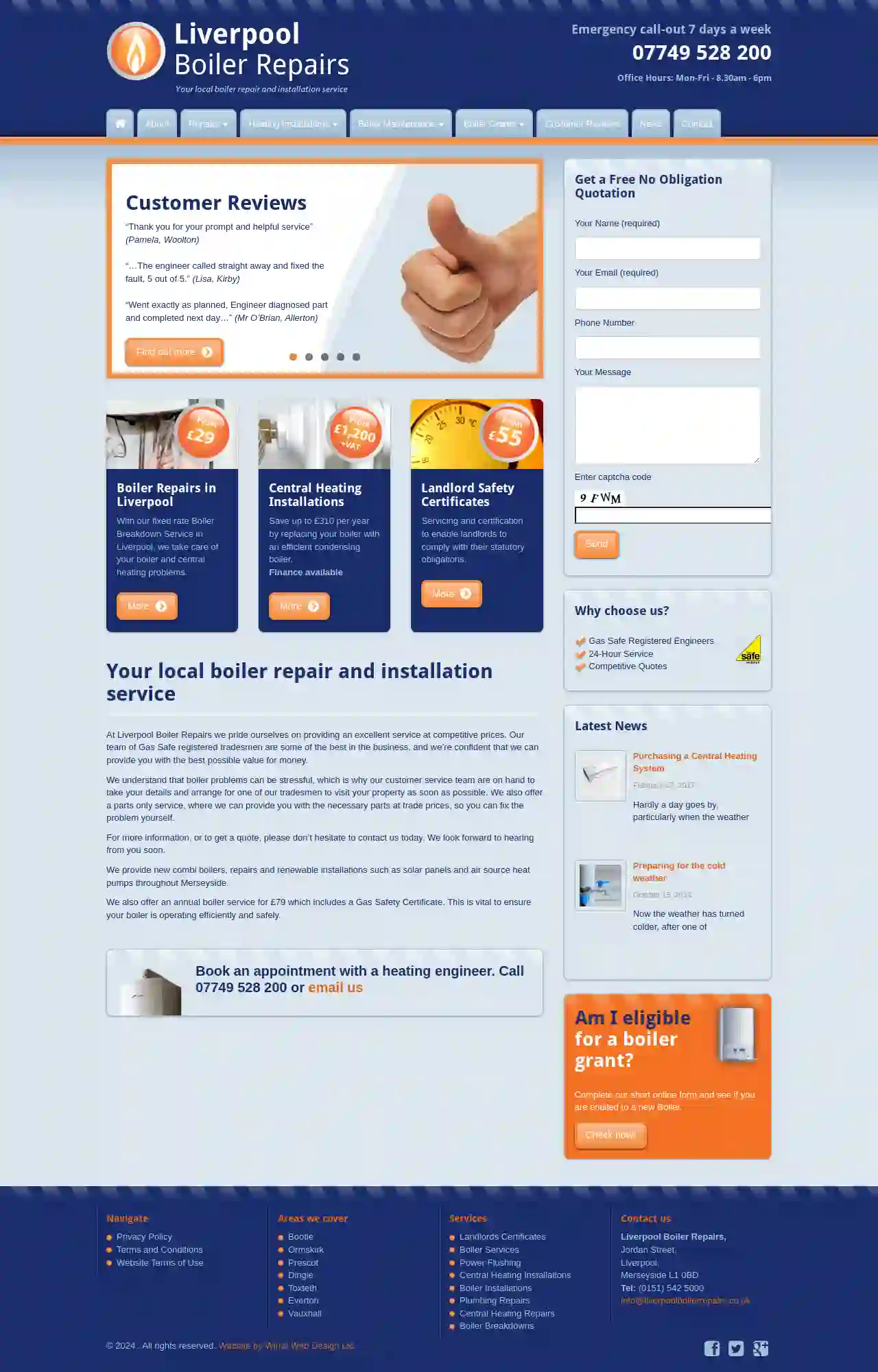HVAC Companies West Derby
Find the best HVAC Contractor in West Derby
Receive up to 3 HVAC Services quotes for your project today! Compare profiles, reviews, accreditations, portfolio, etc... and choose the best offer.

Envatech Limited
51 reviewsLiverpool, GBWe are delighted to announce that this site has been acquired by Shire Heat Pumps, Shropshire. Their site will replace this one soon.
- Services
- Why Us?
- Gallery
Get Quote
Go Assist - Appliance Repairs, Plumbers, Boiler Engineers & Electricians
12 reviewsUnknown, Liverpool, GBAt Go Assist, we provide a one-stop solution for homeowners and landlords, offering services regarding plumbing, electrical, appliances, boilers, locksmiths and pest control. Whether your domestic appliance is faulty, boiler has broken down, fuse box has tripped, or tap is leaking – you have come to the right place. We provide quality repairs for home breakdowns from a team of reliable, vetted engineers. We will always aim to get out to you the same day, boasting an impressive engineer response time and first-time fix rate. Our engineers are not only repair experts but are qualified to assist with installations and replacements such as light fittings, toilets, and showers, making home improvements an easy stress-free process. We are proud to provide services to help landlords abide by the necessary rules and regulations by carrying out boiler services, EPCS, and EICRs in rented properties.
- Services
- Why Us?
- Gallery
Get Quote
Global Cooling Services Ltd
53 reviewsLiverpool, GBGlobal Cooling Services are air conditioning systems specialists with over 30 years experience within the industry. We offer a wide range of services including installations, maintenance and repairs for all types of air conditioning systems. Contact us today for a free quote.
- Services
- Why Us?
- Gallery
Get Quote
Moran Plumbing & Heating Services
3.515 reviewsLiverpool, GBHi my name is John Moran and I own Moran Plumbing & Heating, we are based in the Maghull and Lydiate area and serve customers in and around Liverpool, including Merseyside, Liverpool and West Lancs. If you’re looking for a friendly, reliable and professional local Liverpool plumbing company, we cover all aspects of plumbing, heating, gas & ventilation work and we are Gas Safe and guarantee our work. Please feel free to get in touch to discuss your project and arrange a quote.
- Services
- Why Us?
- Our Team
- Gallery
Get Quote
HAS-Vent Ltd
32 reviewsHeath Mill Road, Wombourne, HAS-Vent Main Works, Wolverhampton, WV5 8AP, GBHAS-Vent is the UK's leading independently-owned provider of ventilation and air movement products to the construction industry. We offer custom manufacturing and a complete range of HVAC products, including various types of ducting, fixtures and fittings, fans, accessories and filters.
- Services
- Why Us?
- Accreditations
- Gallery
Get Quote
Liverpool Boiler Repairs Ltd
3.89 reviewsJordan Street, Liverpool, L1 0BD, GBAt Liverpool Boiler Repairs, we pride ourselves on delivering exceptional service at competitive prices. Our team of Gas Safe registered tradesmen are among the best in the industry, and we're confident in providing you with the best value for your money. We understand that boiler problems can be stressful, which is why our dedicated customer service team is ready to take your details and arrange for one of our skilled tradesmen to visit your property as soon as possible. We also offer a parts-only service, providing you with the necessary parts at trade prices so you can tackle the repair yourself. For more information or a free quote, don't hesitate to contact us. We look forward to hearing from you soon. We provide new combi boilers, repairs, and renewable installations like solar panels and air source heat pumps throughout Merseyside. We also offer an annual boiler service for £79, which includes a Gas Safety Certificate. This is crucial for ensuring your boiler operates efficiently and safely. Book an appointment with a heating engineer by calling 07749 528 200 or emailing us.
- Services
- Why Us?
- Accreditations
- Testimonials
- Gallery
Get Quote
Heat Pumps UK
51 reviewsN/A, GBHeat Pump Grants is a trusted company with years of experience in the industry, dedicated to helping customers upgrade their heating systems and take advantage of available funding schemes. As experts in renewable and green energy, we connect people with free grants to make installing a new heat pump more affordable. We offer a comprehensive, one-stop service, handling everything from arranging a home survey to securing grants and coordinating installation. Our end-to-end approach eliminates the need for multiple third-party companies, ensuring a seamless experience for our clients. We partner with trusted, fully trained, accredited, and certified heat pump installers who deliver high-quality installations with minimal disruption to your home. Air source heat pump installations typically take 2-4 days, while ground source installations may require a longer timeframe due to the ground array. Our installers prioritize efficiency and cleanliness, leaving your property in pristine condition upon completion. We have a proven track record of helping thousands of people access funding through various government-backed initiatives, including Green Deal, Clean Heat Grants, Renewable Heat Incentive, and ECO schemes. We are committed to staying up-to-date with the latest funding opportunities, such as ECO4, to ensure our clients receive the best possible financial support. Eligible households may also qualify for the Boiler Upgrade Scheme (BUS) which offers grants for heat pump installations. Our team is dedicated to providing exceptional customer service and ensuring your new heat pump system delivers efficient heating and cost savings. We offer free aftercare to address any questions or concerns you may have.
- Services
- Why Us?
- Accreditations
- Our Team
- Testimonials
- Gallery
Get Quote
HVAC Brooklyn Contractors
Liverpool, GBWE ARE HERE TO HELP! Brooklyn, NY HVAC Contractors For several decades, we have remained the top choice for HVAC contractors in Brooklyn, New York. Our technicians are highly skilled in providing efficient heating and cooling solutions. We also take the time to answer all of your questions and help you understand how your system works.Whether you are a homeowner or a business owner in Brooklyn, we are here to provide you with the best service possible. Our services are diverse and regularly updated to ensure that we keep up with the latest technology.Our HVAC contractor services come with a 100% satisfaction guarantee, ensuring that you can trust us to do a great job. Please give us a call today to book a free consultation with one of our expert technicians. We are excited to help you enhance the comfort of your home.
- Services
- Why Us?
- Testimonials
- Gallery
Get Quote
FlowFix Plumbing & Heating Liverpool
54 reviewsLiverpool, GBFrom Gas to Plumbing, FlowFix Gets It Done!FlowFix is your one-stop shop for all your gas and plumbing needs. Whether it's installation, maintenance, or repair, our experienced staff can handle it all. With decades of experience, you can trust us to get the job done right, quickly and efficiently. So don't wait - get FlowFix to take care of your gas and plumbing needs today!Contact usWelcome to FlowFix, a trusted provider of domestic plumbing and heating services based in Liverpool. Our team of skilled professionals is dedicated to delivering quality workmanship and exceptional customer service to all of our clients. At FlowFix, we understand the importance of having a reliable and efficient plumbing and heating system in your home. That's why we offer a comprehensive range of services to help keep your system in top condition. Whether you need a repair, installation, or maintenance service, our team has the expertise and tools to get the job done right. We pride ourselves on our commitment to customer satisfaction. From the moment you contact us, our team will work with you to understand your needs and provide the best possible solutions. We strive to keep our customers informed throughout the process, so you can have peace of mind knowing that your home is in good hands. Our services include: Plumbing repairs and installations Heating repairs and installations Boiler services Drain cleaning Gas fitting and safety checks Bathroom and kitchen installations At FlowFix, we are fully licensed and insured, so you can trust us to handle your plumbing and heating needs safely and professionally. Our team is made up of experienced professionals who are dedicated to delivering the highest quality of workmanship and customer service. Thank you for considering FlowFix for your domestic plumbing and heating needs. We look forward to working with you and providing you with exceptional service.
- Services
- Why Us?
- Gallery
Get Quote
HBE (Liverpool)
London, UK, 123 London Road, SW1A 1AA, GBShaping the future of legionella control. HBE is a legionella control and water hygiene specialist with 20 years of experience delivering reliable water hygiene and legionella control services across the UK and Ireland. Our research includes delivering the latest technology for water monitoring, in addition to some of the most advanced water treatment and monitoring research to ensure the most effective Legionella control. We continually focus on innovation, developing new methodologies and consistently enhance the methods used to reduce water risk.
- Services
- Why Us?
- Accreditations
- Our Team
- Testimonials
- Gallery
Get Quote
Over 12,692+ HVAC Companies in our network
Our HVAC companies operate in West Derby and surroundings!
HVACCompaniesHub has curated and vetted Top HVAC Contractors near West Derby. Find the most trustworthy contractor today.
Frequently Asked Questions About HVAC Companies
- Age: Furnaces typically last 15-20 years. If yours is significantly older, replacement is usually the better long-term choice.
- Frequency and Cost of Repairs: If you've been having frequent or expensive repairs, replacing the furnace might be more cost-effective in the long run.
- Energy Efficiency: Newer furnaces are significantly more energy-efficient, which can lead to lower energy bills.
- Safety Concerns: Older furnaces might have safety issues, such as carbon monoxide leaks. A new furnace offers enhanced safety features.
- Experience: Choose a contractor with extensive experience in the HVAC industry, especially in the type of service you need.
- Licensing and Insurance: Verify that the contractor is properly licensed and insured.
- Certifications: Look for NATE (North American Technician Excellence) certification, which indicates a high level of technical competency.
- Reputation: Check online reviews and ratings to assess the contractor's reputation and customer satisfaction levels.
- References: Ask for references from past customers and contact them to inquire about their experience.
- Estimates and Quotes: Get written estimates or quotes from multiple contractors to compare pricing and services.
- Warranty Information: Ask about warranties on equipment and labor.
- Communication: Effective communication is key. Choose a contractor who responds promptly and clearly answers your questions.
- Check Online Reviews: Look for HVAC companies with positive reviews and high ratings on platforms like Google, Yelp, and others.
- Ask for Referrals: Reach out to friends, family, neighbors, or colleagues for recommendations.
- Verify Licensing and Insurance: Ensure the company is properly licensed and insured to operate in your area.
- Look for Certifications: Check for certifications from reputable organizations like NATE (North American Technician Excellence).
- Compare Quotes: Get quotes from multiple HVAC companies to compare pricing and services.
- Use a Directory like HVACCompaniesHub: Simplify your search by using our directory of pre-screened and qualified HVAC professionals.
Should I repair or replace my old furnace?
How do I choose the right HVAC contractor?
How do I find a good HVAC company near me?
Finding a reputable HVAC company requires research. Consider these tips:
What is an AFUE rating, and why is it important?
Should I repair or replace my old furnace?
- Age: Furnaces typically last 15-20 years. If yours is significantly older, replacement is usually the better long-term choice.
- Frequency and Cost of Repairs: If you've been having frequent or expensive repairs, replacing the furnace might be more cost-effective in the long run.
- Energy Efficiency: Newer furnaces are significantly more energy-efficient, which can lead to lower energy bills.
- Safety Concerns: Older furnaces can pose safety risks, such as carbon monoxide leaks. A new furnace offers enhanced safety features.
How do I choose the right HVAC contractor?
- Experience: Choose a contractor with extensive experience in the HVAC industry, especially in the type of service you need.
- Licensing and Insurance: Verify that the contractor is properly licensed and insured.
- Certifications: Look for NATE (North American Technician Excellence) certification, which indicates a high level of technical competency.
- Reputation: Check online reviews and ratings to assess the contractor's reputation and customer satisfaction levels.
- References: Ask for references from past customers and contact them to inquire about their experience.
- Estimates and Quotes: Get written estimates or quotes from multiple contractors to compare pricing and services.
- Warranty Information: Ask about warranties on equipment and labor.
- Communication: Effective communication is key. Choose a contractor who responds promptly and clearly answers your questions.
How do I find a good HVAC company near me?
Finding a reputable HVAC company requires research. Consider these tips:
- Check Online Reviews: Look for HVAC companies with positive reviews and high ratings on platforms like Google, Yelp, and others.
- Ask for Referrals: Reach out to friends, family, neighbors, or colleagues for recommendations.
- Verify Licensing and Insurance: Ensure the company is properly licensed and insured to operate in your area.
- Look for Certifications: Check for certifications from reputable organizations like NATE (North American Technician Excellence).
- Compare Quotes: Get quotes from multiple HVAC companies to compare pricing and services.
- Use a Directory like HVACCompaniesHub: Simplify your search by using our directory of pre-screened and qualified HVAC professionals.